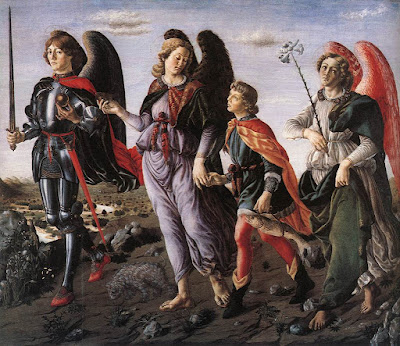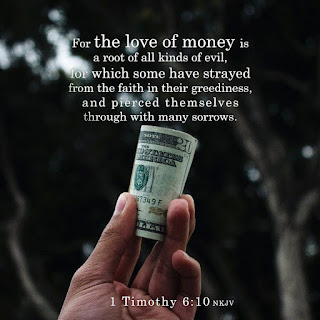The number of angels is nearly countless and they are arranged in the heavenly hierarchy in different choirs. Many of Our Eucharistic prefaces attest to the angels and archangels, throne and dominions and, the hosts and powers of heaven” to whom we are joined in singing God’s glory. Angels, archangels, thrones, dominions and powers, cherubim, seraphim, principalities, and virtues. The angels sing God’s praises which is why they are arranged into choirs.
At the time of our birth we are assigned an angel to guard over us, and the feast of the guardian angels, we celebrate on October 2. We do not know the names of our guardian angels, but we do know the names of three of the archangels from the holy scriptures.
Saint Michael is the "Prince of the Heavenly Host," the leader of all the angels. His name is Hebrew for "Who is like God?" and was the battle cry of the good angels against Lucifer and his followers when they rebelled against God. Michael is mentioned four times in the Bible, in Daniel 10 and 12, in the letter of Jude, and in Revelation. Michael, whose forces cast down Lucifer and the evil spirits into Hell, is invoked for protection against Satan and all evil.
Saint Gabriel, whose name means "God's strength," is mentioned four times in the Bible. God sent Gabriel to announce the birth of John the Baptist to his father Zacharias, and, of course, to the Blessed Virgin to announce the Incarnation. Christian tradition suggests that it is he who appeared to St. Joseph and to the shepherds, and also that it was he who "strengthened" Jesus during his agony in the garden of Gethsemane. Gabriel is invoked when we require God’s strength, especially when we need strength to bear difficult messages, or in public speaking.
Saint Raphael is invoked for healing. Raphael means "God has healed", a fitting name for the archangel sent to heal Tobias' blindness in the Book of Tobit. It is often thought that it was Raphael who descended upon the pool of Bethesda and bestowed God’s healing powers upon it so that the first to enter it after it moved would be healed of whatever infirmity he was suffering.
Praying for protection and the defeat of evil, strength, and healing are common prayers. Daily we should be praying for these things for ourselves and others. And we do well, to recognize the instruments through whom God has chosen to bestow them in the past and continues to bestow them now. May St. Michael bear God’s likeness to us that satan may be driven away from our midst. May St. Gabriel bear God’s strength to us in our many trials and in our mission of the Gospel. And May St. Raphael bear God’s healing to those most in need of it, for the glory of God and the salvation of souls.
Through the intercession of St. Michael, may all who are persecuted for the faith be protected against the wickedness and snares of the devil.
Through the intercession of St. Gabriel, may God’s strength be with all those who work for the Spread of the Gospel.
Through the intercession of St. Raphael may all who suffer from loneliness or sickness know the healing graces of our loving God.
For the deceased members of our families, friends, and parish and all the poor souls in purgatory, for deceased clergy and religious, and for those who have fought and died for our freedom.
Heavenly Father, may our prayers rise like a pleasant fragrance before you and be brought to your altar on high through the hands of your holy angels. Through Christ Our Lord.















